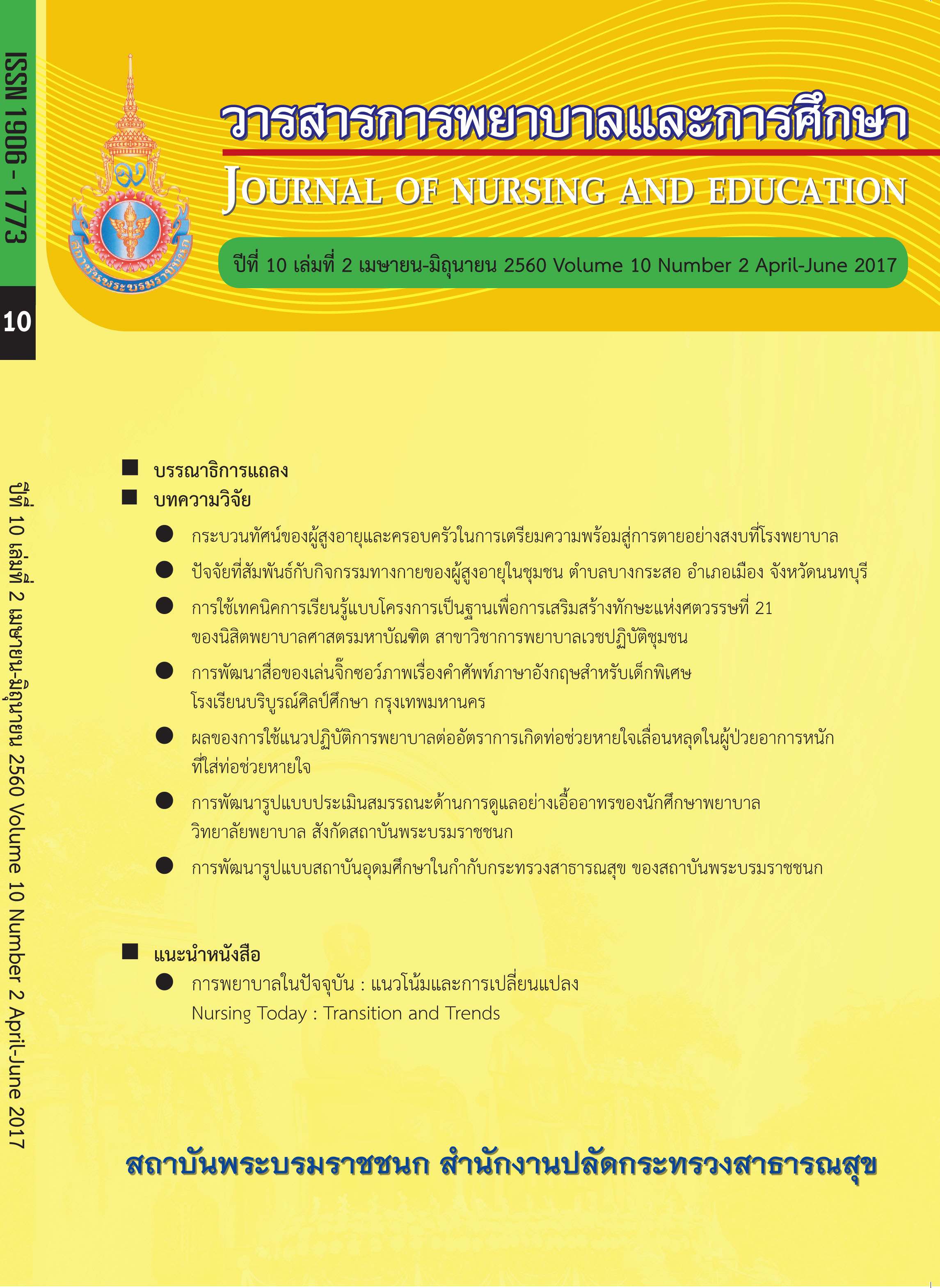การใช้เทคนิคการเรียนรู้แบบโครงการเป็นฐานเพื่อการเสริมสร้างทักษะแห่งศตวรรษที่ 21 ของนิสิตพยาบาลศาสตรมหาบัณฑิต สาขาวิชาการพยาบาลเวชปฏิบัติชุมชน
Using Project-based Learning to Enhance 21st Century Skills of Master’s Students in Nursing Science Program (Community Nurse Practitioner)
Abstract
บทคัดย่อทักษะแห่งศตวรรษที่ 21 เป็นสมรรถนะที่สำคัญของพยาบาลเวชปฏิบัติชุมชนทุกคน การวิจัยเชิงทดลองเบื้องต้นนี้มีวัตถุประสงค์เพื่อศึกษาผลของการใช้เทคนิคการเรียนรู้แบบโครงการเป็นฐานเพื่อการเสริมสร้างทักษะแห่งศตวรรษที่ 21 กลุ่มตัวอย่างเป็นนิสิตหลักสูตรพยาบาลศาสตรมหาบัณฑิต สาขาวิชาการพยาบาลเวชปฏิบัติชุมชน คณะพยาบาลศาสตร์ มหาวิทยาลัยบูรพาที่ลงทะเบียนเรียนรายวิชา 101505 การพยาบาลเวชปฏิบัติชุมชน 2 ภาคการศึกษาที่ 2 ปีการศึกษา 2558 จำนวน 12 คน เครื่องมือที่ใช้ในการวิจัยเป็นแผนการจัดการเรียนการสอนโดยใช้เทคนิคการเรียนรู้แบบโครงการเป็นฐาน และแบบสอบถามทักษะแห่งศตวรรษที่ 21 ของนิสิตพยาบาลศาสตรมหาบัณฑิตที่ให้ผู้เรียนเป็นผู้ประเมินตนเอง ดำเนินการทดลองระหว่างเดือนมกราคม – เดือนพฤษภาคม พ.ศ. 2559 วิเคราะห์ข้อมูลเปรียบเทียบทักษะแห่งศตวรรษที่ 21 ระหว่างก่อนและหลังการเรียนโดยการทดสอบด้วยสถิติวิลคอกซัน ผลการวิจัยพบว่า กลุ่มตัวอย่างที่เข้าร่วมการจัดการเรียนการสอนโดยเทคนิคการเรียนรู้แบบโครงการเป็นฐานมีคะแนนเฉลี่ยทักษะแห่งศตวรรษที่ 21 หลังเรียนสูงกว่าก่อนเรียนอย่างมีนัยสำคัญทางสถิติที่ระดับ .001 การวิจัยนี้เสนอแนะว่า การพัฒนาพยาบาลเวชปฏิบัติชุมชนให้มีทักษะแห่งศตวรรษที่ 21 ผู้สอนต้องเปลี่ยนรูปแบบการจัดการเรียนการสอนที่เน้นเฉพาะการบรรยายมาเป็นรูปแบบการจัดการเรียนการสอนที่เน้นการเรียนรู้ตามปัญหาและความสนใจของผู้เรียนโดยใช้เทคนิคการเรียนรู้แบบโครงการเป็นฐาน
ABSTRACT21st century skills are the significant performances of all community practitioner nurses. This pre-experimental design aimed to investigate the effectiveness of project-based learning for enhancing 21st Century Skills. Participants of the study, 12 Master’s Students in the Nursing Science Program (Community Nurse Practitioner) were enrolled in the 101505 Community Health Nursing 2, 2/2015 Semester. Research instruments were the Project-based Learning teaching plan and self-reported 21st Century Skills questionnaire. Data were collected during January to May, 2016. Data was analyzed by Wilcoxon signed - rank test. The results revealed that after receiving the Project-based Learning program, participants had a 21st Century Skills mean higher than before receiving at p-value .001. This research suggests that the development of 21st century skills in community practitioner nurses, the instructors need to transfer the teaching-learning method from lecturing based to problem and students’ interest focused by using project-based learning techniques.
References
1. Vijarn Panich. Development of 21st century learning. Bangkok: Siam Commercial Foundation; 2013. (in Thai)
2. Thanormchayathawat B, Vanitsuppavong P, Niemted W. 21th Cintury skills: A challenge for student development. The Southern College Network Jourana of Nursing and Public Health. 2016;3(2):208-22. (in Thai)
3. Vijarn Panich. Learning development pathway of student in 21st century. Bangkok: Sodsri-Saritwong Foundation; 2012. (in Thai)
4. Bureau of Non-Communicable Disease Department of Disease Control Miniatry of Public Health. Guidline for community based non-communicable disease control. Nontaburi: Bureau of Non-Communicable Disease; 2009. (in Thai)
5. World Health Organization. Global status report on non-communicable diseases 2014. Geneva: WHO Publications; 2014. Available from: http://apps.who.int/iris
6. Faculty of Nursing Burapha University. Nursing Science Program (Community Nurse Practitioner). Chonburi: Faculty of Nursing, Burapha University; 2011. (in Thai)
7. Bell S. Project-based learning for the 21st Century: Skill for the future. The Clearing House. 2010; 83: 39-43.
8. Office of the Education Council Ministry of Education. Project-based Learning. Bangkok: Office of the Education Council; 2007. (in Thai)
9. Trilling B, Fadel C. Learning and innovation skills: 21st century skills learning for life in our times. San Francisco: Jossey-Bass; 2009.
10. Best, J.W. 1977. Research in Education. 3rd ed. Englewood Cliffs, New Jersey : Prentice Hall, Inc.
11. David JL. Project-based learning. Educational Leadership. 2008; 65(5): 80.
12. Khaliq S, Alam MT, Mushtaq M. An Experimental Study to Investigate the Effectiveness of Project-Based Learning (PBL) for Teaching Science at Elementary Level. International Journal of Academic Research in Progressive Education and Development. 2014; 4(1): 43-55.
13. Husin W, Fadzilah WN, Mohamad Arsad N, OTHMAN O, HALIM L, RASUL MS, OSMAN K, IKSAN Z. Fostering students' 21st century skills through Project Oriented Problem Based Learning (POPBL) in integrated STEM education program. InAsia-Pacific Forum on Science Learning & Teaching 2016; 17(1).
14. Oungvarakorn S. Teacher: Learning of revolution toward quality of education in 21st century. The Southern College Network Journal of Nursing and Public Health. 2015; 2(1): 65-78. (in Thai)
15. Kunlaka S, Purivittayatheera K. Developing English Competency in Nursing Student. Rama Nursing Journal. 2016;22(2):123-33. (in Thai)
16. Turner K, Leungratanamart L, Niranrat S, Jarnarerux J, Wattanakull B, Reunreang T. Twenty first century skills of nursing student of Boromarajonani College of Nursing, Chonburi. Nursing Journal of the Ministry of Public Health. 2015;25(2):178-93. (in Thai)






